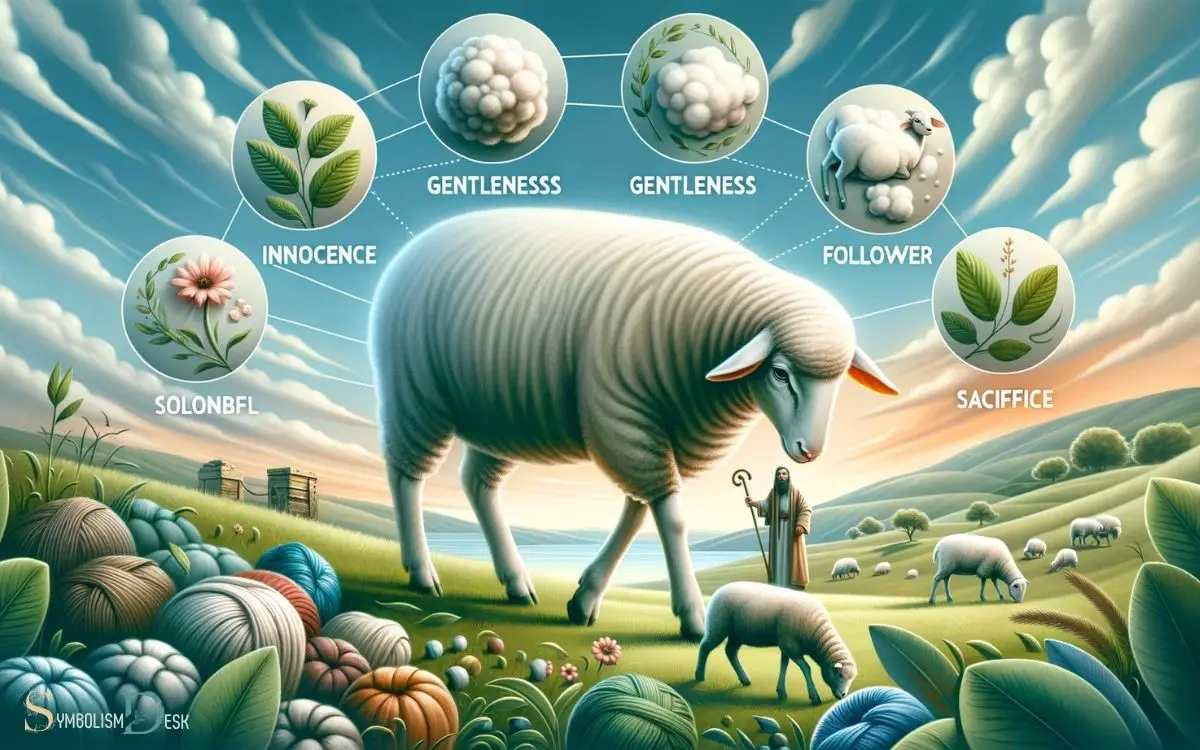What is the Symbolic Meaning of a Sheep? Innocence!
The symbolic meaning of a sheep encompasses notions of innocence, purity, peace, and sacrifice. Throughout history, sheep have been potent symbols in various cultures, often associated with religious and pastoral imagery.
Sheep symbolism is multifaceted and can be broken down into several key concepts:
- Innocence and Purity: Sheep, especially lambs, are often symbols of innocence and purity, commonly used in religious and mythological contexts to represent these qualities.
- Sacrifice: In many religious traditions, sheep are used as sacrificial animals, symbolizing atonement and redemption.
- Peace and Tranquility: The gentle nature of sheep makes them emblems of peace and tranquility.
- Guidance and Following: Sheep are known for their tendency to follow the flock, which can symbolize guidance or, conversely, a lack of individuality.
- Prosperity and Abundance: In agrarian societies, a large flock of sheep indicated wealth and prosperity.
Examples of sheep symbolism include the Christian ‘Lamb of God’, representing Jesus Christ, and the golden fleece in Greek mythology, symbolic of royal power and authority.
Sheep are enduring symbols, reflecting virtues of gentleness and the importance of community in cultures worldwide.

Key Takeaway
9 Symbolic Interpretations Meanings of Sheep Symbolism
| Symbolic Interpretation | Meaning of Sheep Symbolism |
|---|---|
| Innocence | Sheep are often used to symbolize innocence and purity, due to their white color and docile demeanor. |
| Fertility | In many cultures, sheep symbolize fertility and fecundity. |
| Sacrifice | Historically, sheep were often used as sacrificial animals, representing the concept of willingly giving oneself for the greater good. |
| Guidance | A flock of sheep is always led by a shepherd, signifying the need for guidance and leadership. |
| Peace | The gentle behavior of sheep symbolizes tranquility and peace. |
| Humility | Sheep are unassuming and modest creatures, used to symbolize humility in many cultures. |
| Patience | Sheep are patient by nature; they symbolize the virtue of patience. |
| Christianity | In Christianity, sheep are a symbol of Jesus Christ who is often referred to as ‘The Lamb of God’. |
| Provision | Sheep are also seen as a symbol of provision due to their wool and meat. |
Historical and Cultural Significance
The historical and cultural significance of the sheep has been deeply rooted in various societies throughout history. Sheep have played a crucial role in the development of human civilization.
In ancient Mesopotamia, for example, sheep were among the first animals to be domesticated, providing not only wool and meat but also serving as a form of currency and trade.
In many cultures, sheep are symbolic of abundance, fertility, and the cycle of life. They’ve been featured prominently in religious texts and rituals, representing sacrifice, purity, and humility.
Furthermore, the image of the shepherd and his flock has been a powerful and enduring symbol in literature and art, embodying themes of guidance, protection, and community.
The sheep’s influence on human culture and history is undeniable, shaping traditions and beliefs across the world.
Religious and Spiritual Interpretations
Many religious and spiritual traditions have incorporated the symbolic meaning of a sheep into their beliefs and practices.
The sheep is often seen as a sacrificial symbol, representing purity and atonement for sins.
Additionally, the gentle and docile nature of sheep is frequently associated with spiritual qualities such as meekness and humility.
Sheep as Sacrificial Symbol
In religious and spiritual contexts, sheep have been regarded as a symbol of sacrifice for centuries. The significance of sheep as a sacrificial symbol is deeply rooted in various religious traditions and spiritual beliefs.
- Biblical Symbolism: In Christianity, the image of the sacrificial lamb is central to the belief in Jesus Christ as the ‘Lamb of God’ who takes away the sins of the world.
- Symbol of Atonement: In many cultures, offering a sheep as a sacrifice symbolizes atonement for sins and seeking forgiveness from a higher power.
- Spiritual Purification: The act of sacrificing a sheep is often associated with spiritual purification and the cleansing of one’s soul from impurities.
The symbolic representation of sheep as sacrificial animals underscores the profound spiritual and religious significance attached to this humble creature.
Sheep as Gentle Soul
As a gentle soul, the sheep is often revered in religious and spiritual contexts for its peaceful nature and symbolic representation of innocence and purity.
In Christianity, the image of Jesus as the ‘Good Shepherd’ is deeply rooted in the idea of care, compassion, and guidance, reflecting the gentle and nurturing qualities associated with sheep.
The sheep’s docile and non-aggressive demeanor also aligns with the spiritual teachings of non-violence and humility in many belief systems.
In various religious ceremonies and rituals, sheep are often used as sacrificial offerings, symbolizing the innocence and atonement for sins.
Additionally, the sheep’s gentle and calm presence is often seen as a reflection of the human soul’s longing for peace and spiritual tranquility.
This symbolic association underscores the profound spiritual significance of the sheep as a gentle and pure-hearted creature.
Sheep as a Symbol of Innocence
Sheep have long been associated with innocence and purity. Their gentle and docile nature serves as a symbol of these qualities. Biblical references depict sheep as representations of innocence and the need for protection, adding to their symbolic significance.
Additionally, sheep have been featured in various literary works as symbols of innocence. They are often used to convey themes of vulnerability and purity.
Innocence and Purity
The symbolic significance of sheep as a representation of innocence and purity has been recognized across various cultures and traditions. In many societies, sheep are viewed as a symbol of innocence due to their gentle nature and non-aggressive behavior.
Their white fleece often symbolizes purity and cleanliness, further reinforcing their association with innocence.
The following list illustrates the symbolic representation of sheep as a sign of innocence and purity:
- Their docile and gentle demeanor is often seen as a reflection of purity.
- The white color of their fleece is commonly associated with cleanliness and innocence.
- The nurturing and protective behavior of ewes towards their lambs symbolizes maternal purity and care.
These cultural interpretations emphasize the universal recognition of sheep as a symbol of innocence and purity.
This symbolism extends beyond cultural boundaries, as evidenced by its significance in various religious contexts. In the subsequent section, we’ll delve into the biblical references and symbolism associated with sheep.
Biblical References and Symbolism
Biblical literature depicts sheep as a symbol of innocence and purity, reflecting their significant cultural and religious symbolism.
In the Bible, sheep are often used to represent the pure and innocent followers of God. They symbolize the qualities of gentleness, meekness, and docility, which are highly valued in the Christian faith.
The table below provides a brief overview of the symbolic meaning of sheep in biblical references:
| Symbolic Meaning | Explanation |
|---|---|
| Innocence | Sheep represent the innocence of believers and their reliance on the guidance of a higher power. |
| Purity | They symbolize purity of heart and spirit, emphasizing the importance of moral integrity and righteousness. |
| Protection | As shepherds protect their flock, God protects and guides his followers, likened to sheep in biblical texts. |
This symbolism reinforces the idea of humility and the need for divine guidance in navigating life’s challenges, making sheep an enduring symbol of innocence and spiritual purity in biblical contexts.
Transitioning to the subsequent section, the symbolism of sheep is also prevalent in literary works.
Sheep in Literary Works
Literary works often portray sheep as a symbol of innocence, reflecting the enduring cultural and religious significance associated with these gentle creatures.
In literature, sheep are used to convey the following:
- Purity: Sheep are often depicted as pure and untainted, symbolizing uncorrupted innocence and goodness.
- Vulnerability: Their gentle nature and meek disposition make them a poignant symbol of vulnerability and fragility, evoking empathy and compassion.
- Sacrifice: In various literary works, sheep symbolize sacrifice, echoing the biblical connotations of atonement and redemption.
These representations in literature contribute to the perception of sheep as a powerful symbol of innocence and moral purity.
This portrayal resonates with readers, evoking emotions of empathy and compassion for these gentle creatures. Such symbolic significance enriches the depth and meaning of literary works.
This portrayal of innocence seamlessly transitions into the subsequent section about ‘meekness and humility representations’.
Meekness and Humility Representations
Representing meekness and humility, the sheep has been historically associated with these virtues across various cultures and belief systems.
In Christianity, the sheep is often used as a symbol to represent followers who demonstrate meekness and humility in their faith. The biblical reference of Jesus as the ‘Good Shepherd’ further solidifies the association of sheep with these virtues.
Additionally, in Eastern cultures, the sheep is also viewed as a creature that embodies gentleness and docility, further reinforcing its symbolic connection to meekness and humility.
Through its gentle and non-aggressive nature, the sheep serves as a powerful representation of these virtues, reminding individuals to embrace qualities of gentleness, modesty, and humility in their interactions with others and in their approach to life.
Sacrificial Symbolism in Various Contexts
The sheep’s sacrificial symbolism is evident across various cultures and belief systems, highlighting its enduring significance in spiritual and symbolic contexts.
This symbolism is found in:
- Religious traditions: In Christianity, the sheep is often associated with sacrifice, drawing a parallel to Jesus as the sacrificial lamb. Similarly, in Islam, the act of sacrificing a sheep during Eid al-Adha symbolizes obedience to Allah and the willingness to make sacrifices.
- Ancient rituals: In ancient Greek and Roman cultures, sheep were commonly used as sacrificial offerings to appease gods or seek their favor.
- Indigenous practices: Many indigenous cultures incorporate sheep as sacrificial offerings in rituals and ceremonies to seek blessings, protection, or communal harmony.
The sacrificial symbolism of sheep underscores its profound cultural and spiritual significance.
This understanding lays the foundation for exploring the contemporary and modern symbolic meanings.
Contemporary and Modern Symbolic Meanings
Drawing on the enduring sacrificial symbolism of sheep, contemporary and modern interpretations continue to reflect its profound cultural and spiritual significance in various contexts.
In today’s society, the sheep’s symbolism extends beyond religious and traditional sacrificial meanings. It has become a powerful symbol of innocence, gentleness, and peace, often associated with qualities of compassion and vulnerability.
Additionally, the sheep’s representation in environmental and sustainability movements has grown, symbolizing harmony with nature and the importance of responsible stewardship.
In popular culture, the sheep’s symbolism is often used to convey themes of conformity and blindly following others.
Moreover, in the realm of personal growth and spirituality, the image of a shepherd caring for their flock represents guidance, protection, and nurturing of the soul.
The contemporary and modern symbolic meanings of sheep continue to evolve, resonating with diverse audiences seeking deeper understanding and connection.
Conclusion
The symbolic significance of a sheep spans historical, religious, and contemporary contexts. Its representation of innocence, meekness, and sacrifice is deeply ingrained in various cultures and belief systems.
Whether viewed as a religious symbol or a metaphor for gentleness, the sheep holds a timeless and universal meaning that continues to resonate with people today.







